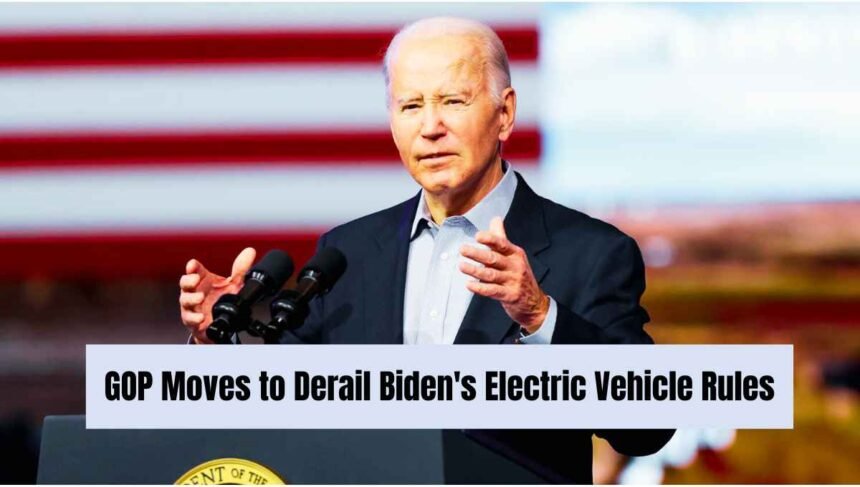In a largely party-line vote, House Republicans passed legislation on Wednesday to block the Biden administration’s proposed stringent vehicle emissions regulations that aim to make electric vehicles mainstream by the end of the decade.
The bill, which passed 221-197 with five Democrats joining 216 Republicans, seeks to bar the Environmental Protection Agency from setting auto pollution standards that would require manufacturers to ramp up electric vehicle production so that zero emissions models make up 67% of new car sales by 2032.
It represents the first major effort by the new GOP House majority to unravel President Biden’s climate change agenda. If enacted, experts warn it would deal a devastating blow to hopes of averting the worst impacts of global warming.
“This Extreme Proposal Would Impair the Auto Industry”
The White House responded with a veto threat, saying the Republican measure would “catastrophically impair” the EPA’s ability to limit climate-damaging tailpipe pollution from cars and trucks, the nation’s largest source of carbon emissions.
Former President Donald Trump, who is again running for the White House in 2024, has vowed to reverse Biden’s electric vehicle rules if elected. During his administration, Trump loosened emissions requirements for gas-powered vehicles that had been put in place under former President Obama.
Republican supporters of the legislation said the EPA plan is overly rigid and aggressive.
“While EVs may play a large role in the future of the auto industry, Washington should not discount other technologies like hydrogen, hybrids, and the internal combustion engine,” said Rep. Tim Walberg (R-Mich.), a sponsor of the bill.
But climate advocates counter the EPA’s proposal provides necessary guardrails for the auto industry as it transitions from decades of churning out gas-guzzling cars and trucks to a zero-emissions future powered by electricity. The standards would cut emissions from new vehicles by 56% by 2030 compared to 2026 levels.
“This extreme proposal from House Republicans would impair the auto industry, which actually wants clear ambitious standards to meet the demand for electric vehicles,” said Rep. Frank Pallone Jr. (D-N.J.), ranking member of the House Energy and Commerce Committee.
Over 9 Billion Tons of Emissions Reductions at Stake
The EPA projects its hotly debated vehicle pollution limits would eliminate more than 9 billion tons of planet-warming carbon dioxide from 2027 to 2055 — over twice the total amount of CO2 spewed in the U.S. last year.
The proposed rules are a centerpiece of Biden’s broader plan to slash America’s emissions in half by 2030 and position the country to run solely on non-carbon electricity by 2035. Transportation has now eclipsed power plants as the number one U.S. source of global warming pollution.
But the auto industry, an influential lobbying force in Washington, is seeking significant changes to soften the regulation’s stringency mandates before it’s finalized next year.
The United Auto Workers union along with major car manufacturers have called on the EPA to adopt a less ambitious counter-proposal that would slow the pace of electric vehicle adoption. Critics argue the current plan relies too heavily on immature battery technology and could make vehicles unaffordable for middle class consumers.
“The EPA proposal should better reflect the feasibility of compliance so that the projected adoption of [zero emission vehicles] is set to feasible levels, increases stringency more gradually, and occurs over a greater period of time,” the UAW said over the summer.
A coalition of foreign and domestic automakers said the EPA rule “would have devastating impacts” on their business and U.S. consumers.
“It is neither reasonable nor achievable,” stated the trade groups representing Toyota, Volkswagen, Mercedes-Benz, Honda and other big brands.
EPA Defends Ambition of the Plan
But the EPA contends its proposal is technically feasible and cost effective using existing technologies. The agency used car industry modeling to shape the landmark standards.
“We developed this proposal using auto manufacturers’ own data and analyses,” EPA administrator Michael Regan told a House committee last month. “So we know that this path is achievable.”
Officials said the plan will save consumers money over time, pointing to a recent Department of Transportation analysis that found electric vehicles have lower ownership costs than gas-powered cars. The savings are estimated to total up to $1,400 per car over 15 years.
The proposed requirements mandate a 17% average annual increase in electric vehicle sales from 2023 to 2026. Then, under the second phase of standards that would take effect in 2027, zero emissions vehicles would need to make up 79% of all passenger car sales by 2030.
For SUVs and trucks, the ramp up schedule is slightly delayed but similarly aggressive, rising to 63% of sales by 2030 before reaching 100% by 2035.
Climate Activists Warn This is Last Chance for Meaningful Action
Climate advocacy groups, many frustrated over Congress failing to pass sweeping emissions legislation, say the EPA rule represents the last opportunity to set the new vehicle market on course to zero out pollution in line with Biden’s climate targets.
The transportation rules are “absolutely essential” to give the U.S. a shot at meeting its Paris Agreement commitment to cut overall emissions by 50-52% by the end of the decade, said Dan Lashof, director of World Resources Institute.
In a June letter, over 200 environmental organizations called the plan “ambitious but achievable” while urging the EPA against bending to pressure from automakers trying to weaken it.
If Republicans are successful in their legislative bid to handcuff the regulation, it could have long lasting climate consequences, experts warn.
“This vote by House Republicans endangers the single largest step America has taken to address climate change and protect public health,” said Fred Krupp, president of Environmental Defense Fund Action.
The path forward faces major political obstacles considering any legislation targeting the emissions rules would need Democratic support to clear the Senate and receive Biden’s signature.
Still, Wednesday’s vote underscores that sweeping vehicle pollution cuts remain divisive in Washington — even as Europe, China and other major car markets around the world are setting aggressive timelines to end sales of new internal combustion engine vehicles.





